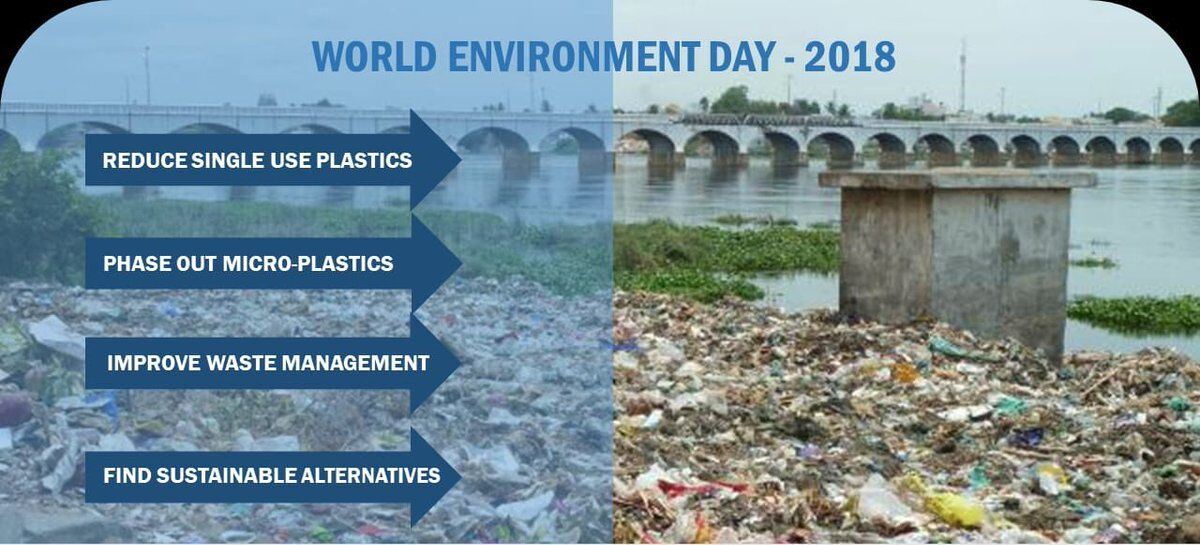
World Environment Day 5 June 2018; Let’s #BeatPlasticPollution
The issue of plastic pollution has become more and more prominent, with heart-wrenching images of marine animals that die after mistakenly eat plastic bags thinking that they are jellyfish regularly being shared on social media. How tragic that just five days before this year’s World Environment Day, which is ironically focussed on stopping plastic pollution, a whale in Thailand died after swallowing 80 plastic bags weighing almost 8 kilogrammes!
Plastic has only really been commonly used since the 1950s, but already more than 9 billion tonnes of it have been made. And it is only becoming more popular. It is estimated that in the last ten years, more plastic was produced than in whole of the last century! About half of this plastic is used only once and then thrown away. Of all the plastic that has ever been made, only 9% has been recycled, with another 12% burnt and almost 80% finding its way to rubbish dumps or just into the environment. Research shows that every year between 5 and 13 tonnes of plastic end up in the ocean. If things continue like this, by the year 2050 about 12 BILLION tonnes of plastic will be in rubbish dumps and the natural environment including our seas, rivers and mountains.
Here in Afghanistan, plastic is by no means less important just because we have no ocean. We’ve already seen how swallowing plastic bags is dangerous, but plastic has many other detrimental effects that can impact the health and well-being of humans and animals. For example, food containers made from Styrofoam have chemicals that can cause cancer. Plastics can poison us and animals, affecting our breathing and reproduction systems. Burning plastic in homes or on the street releases poisonous fumes and contributes to climate change. Chemicals in plastics can also negatively affect the growth of plants, including crops. And we’ve probably all seen pictures or real-life situations of animals getting tangled in plastic waste and dying either because they could not breathe or because they couldn’t move enough to find food or escape from predators.
Another problem with plastic is that it doesn’t decompose properly like organic material would. Instead, it just breaks down into smaller and smaller pieces, known as “micro-plastics”. These micro-plastics are tiny (less than 5 mm) but have a big impact. Small animals will often swallow these micro-plastics, either on purpose because they think it is food, or by mistake while they are eating or drinking something else. Because the plastic can’t be digested properly, the plastics can stay in their bodies for a long time. If other animals eat them, that plastic is passed on. In this way, humans can end up eating plastic if we eat something that ate something else that ate plastic.
So what should we do? Well, the slogan for World Environment Day 2018 is probably the easiest way to address plastic pollution. “If you can’t reuse it, refuse it”. In other words, try to avoid single-use or disposable plastic as far as possible. Across the world, about 1 million plastic bottles are bought EVERY MINUTE! And of course, most of these just get thrown away. So why not get a reusable water bottle that you refill whenever you are thirsty? You can also bring a coffee mug instead of getting takeaway cups, or take reusable bags with you when you go shopping. Every piece of plastic that you don’t use is another piece of plastic that won’t end up in the environment, killing and poisoning wildlife or even ourselves. By only choosing one disposable plastic item that you use regularly, finding a reusable substitute and deciding to never use that item ever again, you’ll still be making a difference. Remember: if you can’t reuse it, refuse it!
For more information, go to http://worldenvironmentday.global/ and https://www.unenvironment.org/ or follow @UNEnvironment on Twitter, and use the hashtags #BeatPlasticPollution and #WorldEnvironmentDay.

